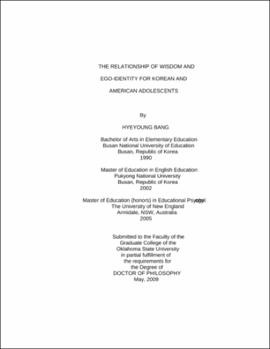| dc.contributor.advisor | Montgomery, Diane | |
| dc.contributor.author | Bang, Hyeyoung | |
| dc.date.accessioned | 2013-11-26T08:34:10Z | |
| dc.date.available | 2013-11-26T08:34:10Z | |
| dc.date.issued | 2009-05 | |
| dc.identifier.uri | https://hdl.handle.net/11244/7303 | |
| dc.description.abstract | Scope and Method of Study: Wisdom is considered to be a strong predictor or determinant of well-being (Ardelt, 2003; Bianchi, 1994; Erikson et al., 1986) as well as the highest human achievement that makes a difference in a person's life (Kramer, 2000; Kunzmann, 2004). Even though some scholars have shown that adolescents may have developmental potential for wisdom (Piaget & Inhelder, 1973; Sternberg, 1998), there is a need to know the direct relationship, and cross-cultural effects. | |
| dc.description.abstract | Findings and Conclusions: This study examined the relationship of wisdom and identity statuses among 358 Korean and American late adolescents (aged 18-22 years old). The results demonstrate that average American adolescents show identity achievement, while average Korean adolescents show identity achievement and moratorium. The 2X5 factorial MANOVAs showed that there is no age effect on ego-identity status, but there is in wisdom dimensions. Univariate analysis shows a significant age effect on the reflective and affective dimensions of wisdom. Subjects in two countries revealed the significant cultural effects for both ego-identity and wisdom dimensions. With a correlation of .3 as significant, the examination of canonical loadings shows a negative correlation between foreclosure, diffusion, and all three wisdom dimensions. There is a positive correlation between identity achievement and all dimensions of wisdom among Korean data. Conclusions are 1) age affects the reflective and affective dimensions of wisdom, 2) culture impacts strongly on both wisdom and identity development, and 3) identity achievement predicts wisdom among Korean adolescents, while American adolescents' identity achievement is not linked to wisdom. The absence of foreclosure and diffusion is a helpful way of understanding wisdom for both Korean and American late adolescents. The function of identity achievement and its relationship with wisdom in both Korean and American subjects needs to be investigated further. | |
| dc.format | application/pdf | |
| dc.language | en_US | |
| dc.rights | Copyright is held by the author who has granted the Oklahoma State University Library the non-exclusive right to share this material in its institutional repository. Contact Digital Library Services at lib-dls@okstate.edu or 405-744-9161 for the permission policy on the use, reproduction or distribution of this material. | |
| dc.title | Relationship of wisdom and ego-identity for Korean and American adolescents | |
| dc.contributor.committeeMember | Edwards, Steve | |
| dc.contributor.committeeMember | Harrist, Steve | |
| dc.contributor.committeeMember | Miller, Janice | |
| osu.filename | Bang_okstate_0664D_10202.pdf | |
| osu.accesstype | Open Access | |
| dc.type.genre | Dissertation | |
| dc.type.material | Text | |
| dc.subject.keywords | adolescents | |
| dc.subject.keywords | canonical correlation | |
| dc.subject.keywords | cross-cultural study (korean and american) | |
| dc.subject.keywords | ego-identity | |
| dc.subject.keywords | manova | |
| dc.subject.keywords | wisdom | |
| thesis.degree.discipline | Educational Psychology | |
| thesis.degree.grantor | Oklahoma State University | |
